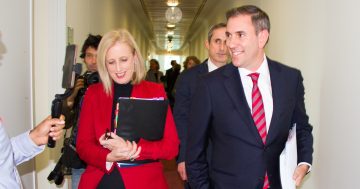
RSM’s Andrew Fernance said the budget would be a careful balancing act. Photo: Michelle Kroll.
Households struggling to pay for medication and energy bills and those looking to buy EVs might expect good news on 9 May when Treasurer Jim Chalmers hands down the 2023/24 Australian Federal Budget, according to valuable insights from leading financial advisers.
On the other hand, a crackdown on dubious claims from landlords and not-for-profits looms.
RSM’s Andrew Fernance said stage-three tax cuts were potentially good news for high-income earners.
“If they come through as expected, people on higher incomes will be paying less tax,” he said.
“While the changes to the superannuation cap will only affect high-net-wealth individuals, it might impact the number of SMEs opting to use super to buy commercial properties.
“SMEs will also be impacted by the Government’s reform mandating superannuation payment on payday, as it could severely affect their cashflow.”
Treasurer Chalmers has hinted at possible measures to reduce the strain on some household expenses.
“We’re expecting cheaper medicines and energy bills,” Mr Fernance said.
“That will most likely be through rebates targeting lower and middle-income earners.”
Mr Fernance said the Government would likely tread lightly when it came to increasing welfare payments, probably focusing any increases on certain vulnerable cohorts.
“Increases to welfare payments are a good thing from a social economic perspective, but the Government will be conscious of the impact that might have on inflation,” he said.
“Rather than making a blanket increase, they’ve indicated a focus on single mothers and over 55s who find it harder to find or maintain work and often have additional financial pressures.”

Possible measures to reduce the strain on some household expenses will most likely target lower and middle-income earners. Photo: iStock.
RSM national tax technical director Liam Telford agreed. He said given the country’s $44 billion deficit forecast and sluggish economic growth, there would be “little room to manoeuvre”.
However, he did point out the salary packaging changes, which meant that eligible electric vehicles valued under the Luxury Car Tax threshold would have no FBT.
“This means you can use your pre-tax income to access this specific class of vehicle, and incur no Fringe Benefits Tax,” Mr Telford explained.
On the other hand, FBT for not-for-profits (NFPs) would come under closer scrutiny.
“The ATO is aware that some NFPs are going beyond benefit arrangements to avoid or reduce exposure to FBT,” Mr Telford said.
“As part of its continued surveillance, the ATO will crack down on misconduct or sham arrangements from NFPs … Presumably, some will fall away and no longer have access to those concessions.”

RSM national tax technical director Liam Telford said this budget could be “a defining one for the Albanese Government”. Photo: RSM Australia.
There will also be continued compliance surveillance by the ATO for investment rental properties.
“It has been estimated that nine out of 10 rental property owners are declaring their net income incorrectly, and the result is an estimated $1.3 billion shortfall per annum,” Mr Telford said.
“The ATO’s army of data scientists will work to correct this. Issues being looked at include borrowing more than is required to supplement a lifestyle and then claiming interest on the loan, the private use of Airbnbs and the distinction between repairs and capital works.”
The Government has already announced a wide range of budget measures, including a $2.2bn injection to the healthcare sector to take pressure off the system, long-term measures for Medicare reform, a focus on digital health, expanding the nursing workforce and additional NDIS funding.
Measures to ease the nation’s housing crisis included improved infrastructure development, increased affordable housing supply, enhanced renters’ rights and tax incentives for build-to-rent developments.
This was punctuated by the recently announced expansion of first-home guarantee schemes aimed at helping more Australians achieve home ownership.
Previously restricted to married couples, singles and those in de facto relationships, from 1 July friends, siblings and other family members will be able to jointly apply for the First Home Guarantee and Regional First Home Guarantee.
“This grants access to this benefit to more Australians, which I think is fantastic,” Mr Fernance said.
Mr Telford said material cash injections for businesses or households beyond what was already promised were unlikely, as was the continuation of taxation offsets or rebates due to end this financial year and a range of business stimulus measures due to end on 30 June, including the SME technology investment boost.
Still, he believed that this budget could be “a defining one for the Albanese Government if used to seed the Treasurer’s vision for ‘a new values-based capitalism’ in the country”.
RSM will host a webinar open to all the morning after the budget to unpack the outcomes.
External panellists such as leading personal finance commentator Effie Zahos, CommSec chief economist Craig James and The Centre for International Economics executive director David Pearce will join Mr Telford and other RSM advisers to provide insights into the budget, its implications and its winners and losers, and take questions from the audience.
The Expert Insights into the 2023/24 Australian Federal Budget webinar takes place at 10:30 am on Wednesday, 10 May – register now.
Original Article published by Dione David on Riotact.
Region Media Partner Content









